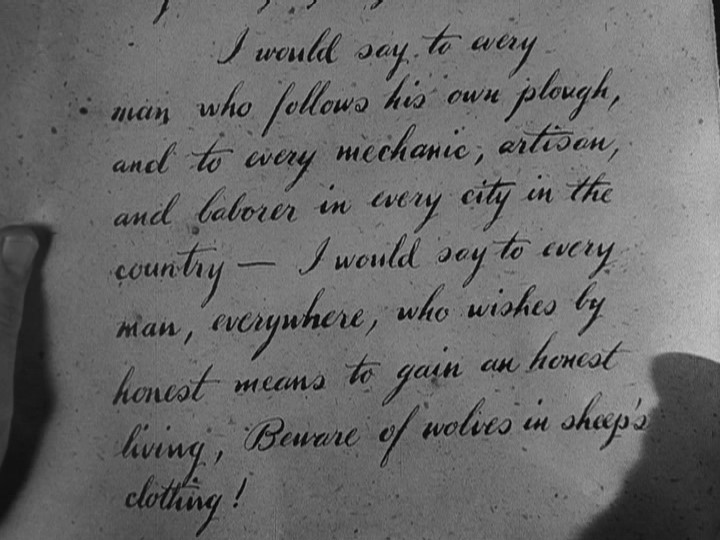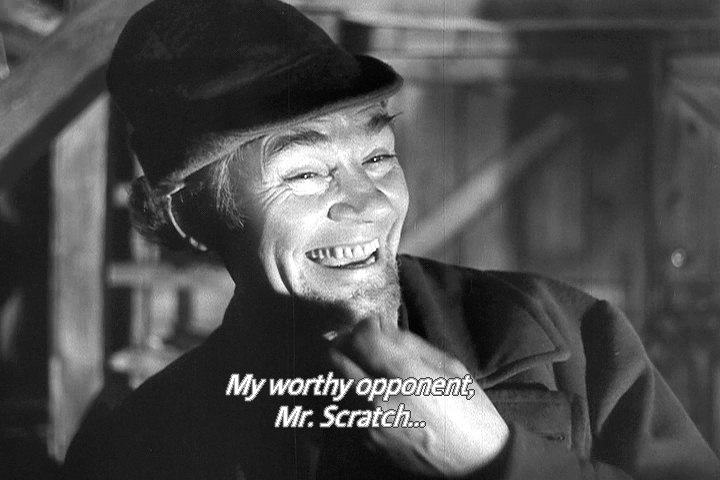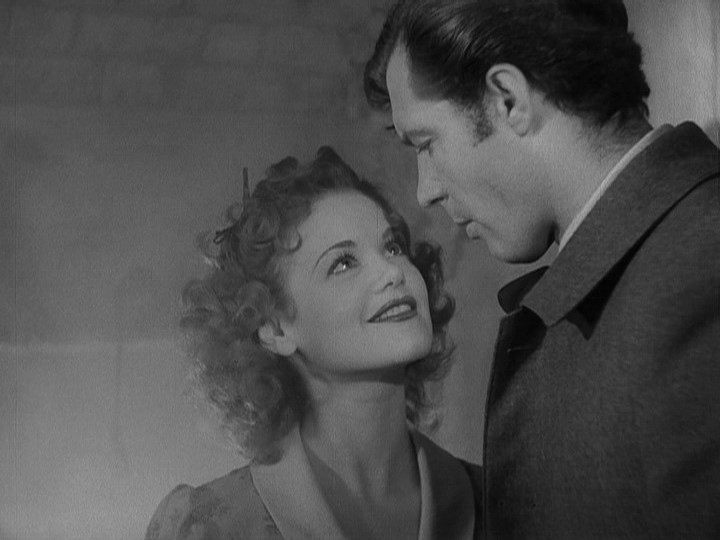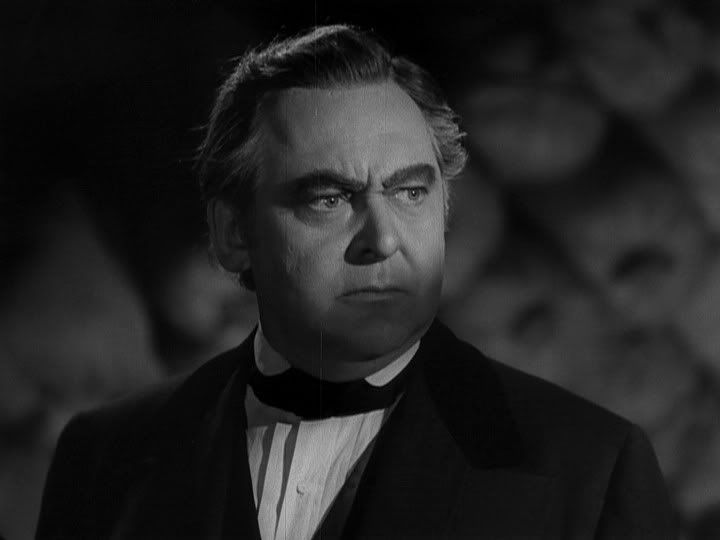← Back to Reviews
in
The Devil and Daniel Webster (William Dieterle, 1941)

Those are the words that Daniel Webster (Edward Arnold) mulls over early on in this wonderful film, but the Devil, aka Mr. Scratch (Walter Huston), tells him that it doesn't matter much because if he doesn't sell his soul, then Webster will never become President of the United States. These adversaries have much to contribute to this sometimes down-home, sometimes mindblowing adaptation of Stephen Vincent Benet's story. Director William Dieterle, who fled Germany for the U.S. in 1931, is mostly known as Warner Bros. "Go-To" director for various prestigious biographies, many starring Paul Muni, but he should not be shortchanged of his position as one of the more-personal directors working in the Studio System. Besides this classic, he also made such films as the delightful pre-Code Jewel Robbery, Charles Laughton's magnificent The Hunchback of Notre Dame (1939) and the trippy noir The Accused (1948).

The premise of the film is that hardworking but dirt-poor farmer Jabez Stone (James Craig in a career performance) is having difficulty on his New England farm (somewhere near the border where Massachusetts, Vermont and New Hampshire meet up). All the farmers in the area are hard up, but Jabez cannot seem to support his pretty young wife Mary (Anne Shirley) and God-fearing Ma (Jane Darwell). Well, when a bag of seed is ripped open and lost, a calf has to be sold to make a property payment, and Mary injures herself, Jabez spits out loud, "Consarn it! Well, if that ain't enough to make a man sell his soul to the Devil...and I would too for about two cents." He realizes what he did and whispers, "I guess nobody heard." Oops! The next thing he knows he finds two pennies in his pocket and this wacko guy Scratch shows up with a contract, offering him seven years of "Money and ALL That Money Can Buy". Jabez accepts the offer, somehow missing out on the importance of what happens after the seven years.

This film was made at RKO and released about five months after the studio put out a little home movie called Citizen Kane. Most of the crew and technicians from Kane also worked on this film, and it shows in the spectacular visuals and sound. One example of something basically unrivaled in film to this day is the scene of the dance/party celebrating Mary's about to give birth. The neighbors have all gathered in Jabez's barn for the occasion while Mary is upstairs in the house going through childbirth with Jabez's Ma's help. Mr. Scratch has brought with him an exotically-attractive woman named Belle (Simone Simon), from "Over the Mountain". The dance scene where Jabez falls helplessly in love with Belle is a masterpiece of lighting, sound, movement, sets, and music; the last part provided by Scratch himself, as he plays the most-devilish version of "Pop Goes the Weasel" on his violin that anyone will ever hear. The score is provided by Bernard Herrmann, who received the film's only Oscar and the only one of his illustrious career. (He was also nominated that year for Citizen Kane.)

The movie culminates in an awesome scene where Jabez Stone goes before a Judge and Jury of the Damned to decide his fate, with Webster defending and the Devil prosecuting. It is a truly memorable ending to a must-see film. When I grew up watching this film on TV, it had already been edited for re-release to 85 minutes. This was done because it was no longer a first-run feature, but the distributor thought they could maximize profits by running it as the second feature in the 1950s with a newer, undoubtedly weaker first run film. That was the version which was available on TV for everyone. So, I'm happy that Criterion has added 22 minutes to make it as long as they could find. It's true that you can often see the difference in the quality of the film's transfer based on what was restored, but that shouldn't matter to a true film buff. It was great at 85 minutes and it's just that much better at 107.

Those are the words that Daniel Webster (Edward Arnold) mulls over early on in this wonderful film, but the Devil, aka Mr. Scratch (Walter Huston), tells him that it doesn't matter much because if he doesn't sell his soul, then Webster will never become President of the United States. These adversaries have much to contribute to this sometimes down-home, sometimes mindblowing adaptation of Stephen Vincent Benet's story. Director William Dieterle, who fled Germany for the U.S. in 1931, is mostly known as Warner Bros. "Go-To" director for various prestigious biographies, many starring Paul Muni, but he should not be shortchanged of his position as one of the more-personal directors working in the Studio System. Besides this classic, he also made such films as the delightful pre-Code Jewel Robbery, Charles Laughton's magnificent The Hunchback of Notre Dame (1939) and the trippy noir The Accused (1948).

The premise of the film is that hardworking but dirt-poor farmer Jabez Stone (James Craig in a career performance) is having difficulty on his New England farm (somewhere near the border where Massachusetts, Vermont and New Hampshire meet up). All the farmers in the area are hard up, but Jabez cannot seem to support his pretty young wife Mary (Anne Shirley) and God-fearing Ma (Jane Darwell). Well, when a bag of seed is ripped open and lost, a calf has to be sold to make a property payment, and Mary injures herself, Jabez spits out loud, "Consarn it! Well, if that ain't enough to make a man sell his soul to the Devil...and I would too for about two cents." He realizes what he did and whispers, "I guess nobody heard." Oops! The next thing he knows he finds two pennies in his pocket and this wacko guy Scratch shows up with a contract, offering him seven years of "Money and ALL That Money Can Buy". Jabez accepts the offer, somehow missing out on the importance of what happens after the seven years.

This film was made at RKO and released about five months after the studio put out a little home movie called Citizen Kane. Most of the crew and technicians from Kane also worked on this film, and it shows in the spectacular visuals and sound. One example of something basically unrivaled in film to this day is the scene of the dance/party celebrating Mary's about to give birth. The neighbors have all gathered in Jabez's barn for the occasion while Mary is upstairs in the house going through childbirth with Jabez's Ma's help. Mr. Scratch has brought with him an exotically-attractive woman named Belle (Simone Simon), from "Over the Mountain". The dance scene where Jabez falls helplessly in love with Belle is a masterpiece of lighting, sound, movement, sets, and music; the last part provided by Scratch himself, as he plays the most-devilish version of "Pop Goes the Weasel" on his violin that anyone will ever hear. The score is provided by Bernard Herrmann, who received the film's only Oscar and the only one of his illustrious career. (He was also nominated that year for Citizen Kane.)

The movie culminates in an awesome scene where Jabez Stone goes before a Judge and Jury of the Damned to decide his fate, with Webster defending and the Devil prosecuting. It is a truly memorable ending to a must-see film. When I grew up watching this film on TV, it had already been edited for re-release to 85 minutes. This was done because it was no longer a first-run feature, but the distributor thought they could maximize profits by running it as the second feature in the 1950s with a newer, undoubtedly weaker first run film. That was the version which was available on TV for everyone. So, I'm happy that Criterion has added 22 minutes to make it as long as they could find. It's true that you can often see the difference in the quality of the film's transfer based on what was restored, but that shouldn't matter to a true film buff. It was great at 85 minutes and it's just that much better at 107.
